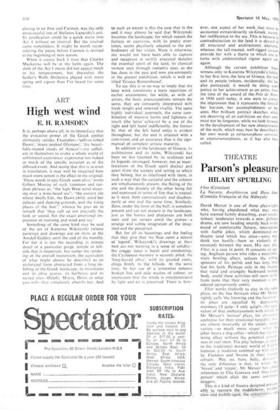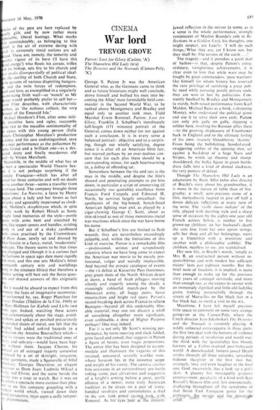THEATRE
Parson's pleasure
HILARY SPURLING
Flint (Criterion) La Navette, Amphitryon and Dom Juan (Comedic Francaise at the Aldwych) David Mercer is one of those playwrights who, having abandoned what may once have seemed faintly disturbing, even revolu- tionary tendencies towards a new, plebeian drama, are now heading smartly back to the mood of comfortable flattery, interspersed with feeble jokes, which dominated our theatre (and which has since—some may think too hastily—been so violently de- nounced) between the wars. His new play. Flint, is a case in point. It concerns an age ing, Anglican parson who rides a motorbike. visits bowling alleys, seduces the willing spinsters of his parish and has long since lost his faith. Perhaps only in the theatre. that staid and strangely backward looking body, could these activities still seem so far from tame that their very mention is con- sidered uproariously comic. Flint works tirelessly to stay in the same place, on the line between what Mr Mercer rightly calls 'the knowing and the facetious: its jokes are signalled by deprecating murmurs CI quip—I only quip')—the equi- valent of that embarrassment with which. in Mr Mercer's 'serious' plays, his characters apologise for their emotional turgidity : they are almost invariably of the simple, sexual variety—so much more risque when the joker wears a dog-collar—which has the titil- lating effect without the potential aloord- ness of real smut. The play belongs, in short- to the traditional nursery world of English humour, A tradition summed up with relish by Flanders and Swann in their lousing. refrain: 'Pee, po, bum, belly, drassers!. the only difference is that, to words like 'breast' and 'nipple', Mr Mercer has added references to Che Guevara and 'that Lenin person' which elicit the same automatic sniggers. This is a kind of theatre designed proton- ably to reassure the middlebrow., middle' class and middle-aged; the conseryatice ten. cies of the past are here replaced by wally glib, and by now rather more Pectable liberal leanings. What marks int unmistakeably, as belonging to this hool. is the air of extreme daring with ich its extremely timid notions are ad- nced. These are, namely, the temerity and archic vigour of its hero ('I have this vial energy') who flouts his curate, trifles ith his bishop, sets fire to his church and • 11 speaks disrespectfully of political ideal- : the sterility of both Church and State, the persons of various dispiriting hangers- ; and the twin forces of redemption, uth and love, as exemplified in a singularly convincing Irish waif—or 'wench' as Mr ercer would probably prefer to call her— horn Flint describes, with characteristic mbast, as 'the nubious colleen, the very emeter of the Emerald Isle.'
Michael Hordern's Flint, after some initi- ly inventive leers and ogles, succumbs iher fast to the maudlin sentimentality of scenes with this young person (Julia ter). Christopher Morahan's production clumsy and his cast undistinguished, save r a neat performance as the policeman by mes Grout and a brilliant one—as a des- cited, dotty and finally murderous old aid—by Vivien Merchant. Meanwhile, in the middle of what has so r been a spectacular World Theatre Sea- , it is not perhaps surprising if the omedie Francaise—which has after all fisted for three centuries and will no doubt rive another three—seems a traveller from antique land. The company brought three oductions: La Navette, a farce by Henry t,que about a lady and her lovers as fast J jerky and agreeably impersonal as clock- Moliere's Amphitryon which, in spite nifty work by Robert Hirsch as Sosie, ought fond memories of the style—portly cures with arms bent and stretched by ns, like teapot spouts and handles, striding c-nly in and out of a shaky cardboard le—once practised by the Crummleses; -J Dom Juan, newly set and dressed by Gustin in a fancy, metal, 'modernistic' -d,cape. The theory seems to be that times ,e changed and (though it is a curious fact at fashions in space ages date more rapidly an most, and this one sets Moliere's bitter ■ enteenth century wits and worldlings .mly in the nineteen fifties) that therefore a meless setting will best suit the fierce ques- ons and shrewd answers of this enigmatic ay.
But it would be absurd to expect from this mpany the feats of imaginative reconstruc- on performed by, say, Roger Planchon for eory Dindan (Theatre de la Cite, 1969) or Hans Holtman for Kabale and Liebe two eeks ago. Indeed, watching these actors ove ceremoniously about the stage, avoid- g blobs and spikes or perched precariously upended sheets of metal, one felt that the gner had added unkind hazards to a oduction (by Antoine Bourseiller) which- nce its virtues were the traditional ones of '11'4 and sobriety—would have been }tap- er without them. Jacques Charon, his bitual air of outraged majesty somewhat ampered by a set of skintight, turquoise, ather garments, made a Sganarelle of fitful 1endour; Georges Descrieres an elegant arcissus as Dom Juan; Ludmila Mikael a rely- sad Elvire; and the scene beside the aside was a treat to watch. But it was on e whole a spectacle more curious than plea- nt to see this company grappling with a odern world which, viewed down their and perspective, must seem a sadly tempor- Y Phenomenon.



































 Previous page
Previous page